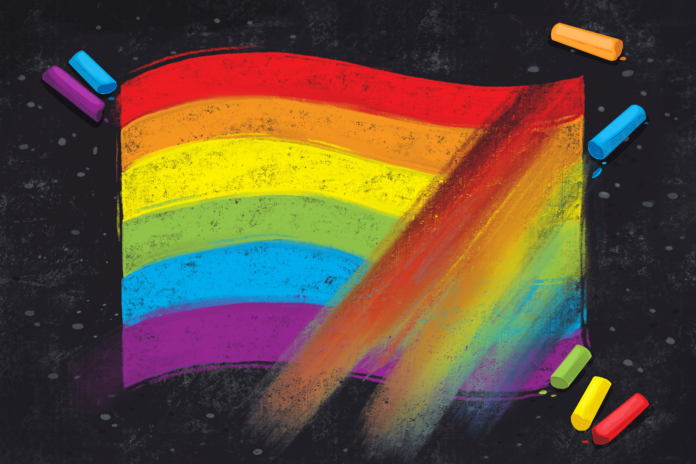/AntiLGBTQLegislationandRhetoric-v1-527bffe28a7d4fd9bd5d3a0a870ffd82.png)
Key Takeaways
- A historic number of proposed anti-LGBTQ+ bills and an alarming rise in charged rhetoric against the community are damaging the mental health of queer folks.
- The absence of emotional or physical safety can have wide-ranging health effects. When people live in a prolonged state of fear, anxiety, and hopelessness, it can lead to or exacerbate mental and physical health conditions.
- Members of the LGBTQ+ community can do their best to cope, but they also need allies to speak up on their behalf.
Thomas Daniels has been living with bipolar disorder for well over a decade, but lately, they’ve found it increasingly challenging to manage their symptoms. As a non-binary person, Daniels has been watching the escalating attacks against LGBTQ+ people in horror. They are living in constant anxiety about what the future may hold for themselves and their community.
Daniels is far from alone. As an alarming rise in charged rhetoric has rippled across the United States in recent months, queer people and allies have been watching in fear.
For example, hundreds of bills were filed in the first half of 2022 with the goal of greatly limiting the rights of LGBTQ+ Americans. The majority of the bills target transgender people.
Conservative lawmakers and public figures have used derogatory, loaded tropes to incite fear and anger toward the community—for example, falsely labeling queer people as “groomers” and pedophiles. An uptick in threats and violence against LGBTQ+ spaces and groups has followed.
“It triggers those negative feelings,” Daniels told Verywell. “Am I safe? Am I going to be able to have rights, to be able to live a meaningful and fulfilled life? And it’s compounded by also being a person of color. So, all of that really makes it more difficult to get to that point of balance for me personally.”
An Undeniable Mental Toll
Like Daniels, many members of the LGBTQ+ community say that these events have taken a toll on their mental health—and it hasn’t relented. “How are we supposed to move forward when our rights are taken away?” wondered Daniels.
According to a poll released by the Trevor Project in January, over two-thirds of LGBTQ+ youth said that debates over anti-trans laws have had a negative impact on their mental health.
Data released by the Centers for Disease Control and Prevention (CDC) in April showed that one in four lesbian, gay, and bisexual youth attempted suicide in the first half of 2021. Though the results are incomplete, the statistics for trans youth are looking even more disheartening.
Thomas Daniels
How are we supposed to move forward when our rights are taken away?
— Thomas Daniels
Similar data for queer adults are also lacking, but anecdotal evidence suggests that people who were already facing poor mental health are finding their circumstances exacerbated by the fear of losing their basic human rights. This includes many members of the community, as discrimination against LGBTQ+ persons has long been associated with higher-than-average rates of psychiatric disorders, substance abuse, and suicide.
About two-thirds of LGBTQ+ youth said that debates over anti-trans laws have taken a toll on their mental health.
Throughout this time, Savannah Kaiser’s anxiety has become much more severe. They told Verywell that they spend a lot of time worrying about how people will react when they’re out in public with their girlfriend. They also worry about whether they’ll even have the option to marry their partner or have a child if they choose.
“I already have a ton of anxiety and it just adds on to that,” said Kaiser. “It’s hard to try and imagine the future. And it just seems very unfair because people who are straight—they get to just have that fairytale life that they imagine. And that’s always up in the air for queer people, whether it’s going to be a possibility or not. [Even though] it is today, it could be in jeopardy tomorrow.”
Discrimination Is Becoming More Obvious
It was only in 2003 that the U.S. officially decriminalized gay sex. Same-sex marriage has only been legal nationwide since 2015.
Now, these hard-won rights are once again at risk. Following the ultraconservative Supreme Court’s recent decision to overturn Roe v. Wade—the law that guaranteed the right to abortion—in a solo concurring opinion, Justice Clarence Thomas said that the court should also reconsider the rulings that protect contraception, same-sex relationships, and same-sex marriage.
Kaiser said that these moves embolden people to be more open with their prejudices—which is deeply anxiety-inducing in and of itself.
“If those things start to change, that is when the rest of the people around that are not queer and don’t agree with people being queer for whatever reason[…] that’s when they’re going to start to feel safe to speak their voice and to attack people,” said Kaiser. “That’s when the harassment starts to escalate because people are going to start to feel safe to do those things because the policy is backing them up.”
Kaiser said that this creates a terrifying environment for queer people—many of whom have already lost whatever sense of safety they once had.
As an attorney who is trans, Alejandra Caraballo has been watching the situation closer than most. She told Verywell that she’s been struggling with her mental health as a result.
Caraballo has been living with seasonal affective disorder (SAD) and depression since well before the cultural climate became increasingly hostile towards trans people. She told Verywell that she’s had to increase her anti-anxiety medications to cope with the “pervasive feeling of pessimism.”
“It just feels like we’re just on this negative path and waking up every day and feeling like the situation is only getting worse doesn’t help,” said Caraballo. “I feel like hope is an incredible coping mechanism…but increasingly it doesn’t feel like there’s any sense of things getting better, and when you get rid of that hope, you get left with this sense of despair, anxiety, anger, and depression, because these things are entirely out of your control.”
Alejandra Carabello
I feel like hope is an incredible coping mechanism…but increasingly it doesn’t feel like there’s any sense of things getting better.
— Alejandra Carabello
The Absence of Safety Increases Anxiety
Mere Abrams, LCSW is a clinical social worker and the co-founder of Urbody Functional Fashion—a brand of gender-affirming underwear and activewear that aims to address gender dysphoria and expand options for trans, non-binary, and gender non-conforming people.
As a trans person, Abrams said that they, too, have been greatly affected by the rising hate and violence targeting the LGBTQ+ community.
“I’m definitely more anxious than I have been in years,” said Abrams. “I often worry about my future, my family’s future, and the well-being of my community and loved ones.”
Abrams said that they’ve consistently noticed similar sentiments among their clients. In their practice, they’ve observed people living with “warranted” hypervigilance and an increased sense of anxiety. Many people are living in a constant state of fight or flight—something that can be extremely damaging to both their mental and physical health.
“Queer and trans folks across the country are being kicked off sports teams, fired from their jobs, and are at risk of losing access to lifesaving gender-affirming healthcare,” said Abrams. “Even if you aren’t living in a state or community that is experiencing rampant discrimination firsthand, just knowing that it’s happening everywhere makes it harder and harder to feel a sense of emotional and physical safety.”
Abrams said that the absence of emotional or physical safety can have wide-ranging health effects. It often puts people in a prolonged state of fear, anxiety, and hopelessness, which in turn can lead to mental health concerns such as depression, panic attacks, generalized anxiety, and PTSD.
The absence of safety can also exacerbate existing mental and physical health issues, which Abrams pointed out already disproportionately affect LGBTQ+ folks.
How to Cope
While the negativity and uncertainty are overwhelming, there are things that queer people can do to take care of themselves. Here are a few ideas from Abrams:
It can also be incredibly helpful to talk to a mental health professional—especially one who is a member of the community and can relate to your experience on a personal level. A therapist or counselor can provide much-needed support and comfort in difficult times.
It’s not just up to the community to cope with the current situation and try to find solutions. Abrams said that now more than ever, queer people need allies to speak up on their behalf.
“It’s time for allies to take action and use their voices—no matter who they are or where they live,” said Abrams. “Let your loved ones know you’re there for them, you love them, and will stand up for their rights.”
What This Means For You
If you’re a queer person trying to protect your mental health amid the violence and hate, know that you’re not alone. Reach out to your loved ones and mental health professionals for support, and do whatever you can to prioritize your wellbeing. If you’re an ally, use your voice to stand up for the LGBTQ+ community.








